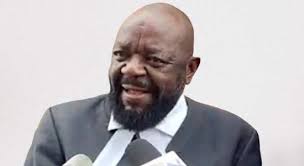Lawyers representing Nnamdi Kanu, the leader of the Indigenous People of Biafra (IPOB), have vowed to challenge his life imprisonment sentence delivered by the Federal High Court in Abuja. Speaking to journalists shortly after the ruling, lawyer and legal consultant Aloy Ejimakor described the judgment as “a symbol of the travesty of justice,” insisting the team will appeal the decision and fight all the way to the Supreme Court if necessary.
The ruling, delivered by Justice James Omotosho, convicted Kanu on all seven terrorism-related charges brought against him by the Federal Government. The judge sentenced him to life imprisonment on four of the counts, along with additional prison terms of 20 years and five years on two other counts, with all sentences running concurrently. The decision has sparked strong reactions across the country and renewed debates about the long-running conflict between the Nigerian state and IPOB.
Speaking at the court premises, Ejimakor strongly rejected the judgment, arguing that Kanu was convicted for “mere spoken words” rather than any direct violent action. He said such a conviction sets a dangerous precedent that must be challenged.
“What kind of precedent is being laid here? We are heading to the Court of Appeal,” he said.
He explained that the appellate court plays a crucial role in reviewing judgments from lower courts, adding that the team believes the justices will overturn the ruling.
“The Court of Appeal is the only court in this country, or the next court in this country, that sits as a jury. We are going to approach justices there to check out what happened in court today. And we are pretty sure the justices will agree with us that today was the symbol of the travesty of justice that everybody has been suspecting,” he said.
Ejimakor insisted that Kanu would not remain convicted after the appeal process. “If the Court of Appeal disagrees with us, we head to the Supreme Court. Nnamdi Kanu is not going to stand convicted. He’s going to get overturned.”
The legal consultant continued to argue that the judgment was not based on substantial evidence. According to him, the prosecution failed to link Kanu’s statements or broadcasts to any specific act of violence, yet the court proceeded to convict him under Nigeria’s terrorism laws.
“This is the only day I have witnessed a man being convicted for mere pronouncements, just for what he said from his mouth, not what he did with his own hands,” he said.
He added that the sentence was “overbroad, cruel and unusual,” suggesting that it violates basic principles of fairness and justice.
“How can you convict a man for making a mere broadcast from a location that was never named and he never tied that broadcast to any single incident of violence, or even someone slapping someone, not to talk of terrorism,” Ejimakor argued.
Nnamdi Kanu has been a highly controversial figure in Nigerian politics for years. As the leader of IPOB, he has championed the call for an independent Biafra Republic, a cause that has deep historical roots dating back to the Nigerian Civil War. IPOB grew rapidly among young people in the South-East, many of whom felt excluded from political and economic opportunities.
Kanu was first arrested in 2015 on charges of treasonable felony, sparking widespread protests. After being granted bail in 2017, he fled the country during a military operation in Abia State known as Operation Python Dance. From abroad, he continued to speak through broadcasts, including Radio Biafra, where he criticised the Nigerian government and promoted the separatist cause.
The Federal Government declared IPOB a terrorist organisation in 2017 and blamed the group for multiple attacks on security personnel and public property in the South-East. Kanu was later re-arrested in June 2021 in a controversial operation and returned to Nigeria to face trial.
In his judgment, Justice Omotosho said the prosecution had provided solid evidence linking Kanu’s statements and actions to violence and insecurity in the region. He described Kanu as an “international terrorist” whose influence contributed to bloodshed and fear.
The judge said the gravity of the charges should ordinarily attract the death penalty under the Terrorism Prevention and Prohibition Act. However, he stated he had chosen to temper justice with mercy by imposing life imprisonment instead.
Kanu did not present a defence during the trial, choosing instead to rely on the prosecution’s evidence. Justice Omotosho said this decision strengthened the case against him.
The sentencing has raised fresh concerns about security, stability, and political dialogue in the South-East. Supporters of Kanu have long argued that he is being targeted for speaking out against marginalisation, while critics say IPOB’s activities have contributed to violence, economic disruption, and the weakening of state authority in the region.
Ejimakor confirmed that preparation for the appeal is already underway. The team will argue that the High Court misapplied the law and ignored key principles regarding freedom of speech and the requirement for physical evidence linking a suspect to acts of terrorism.
He expressed confidence that the Court of Appeal—and, if necessary, the Supreme Court—would eventually overturn the ruling.
“Nnamdi Kanu is not going to stand convicted,” he insisted again. “He’s going to get overturned.”
For now, Kanu remains in detention as his legal team prepares for the next phase of the legal battle. The appeal process, when filed, will likely draw national and international attention, especially from human rights groups and foreign observers who have followed the case closely.

